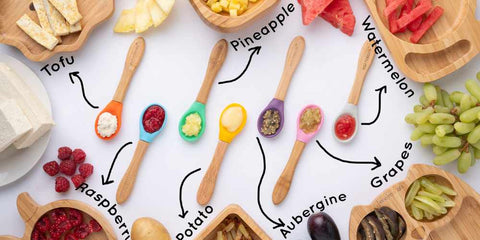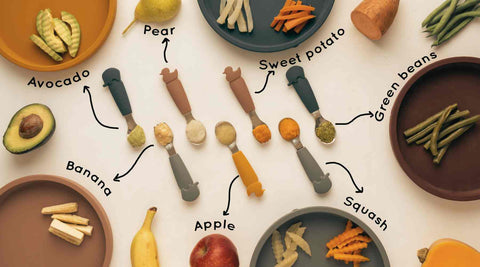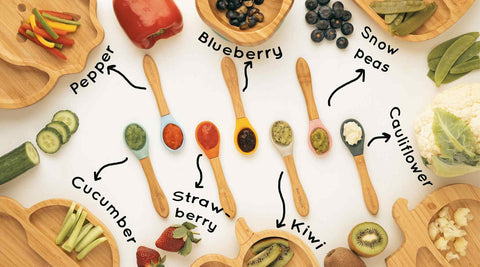A weaning guide
In our third instalment of first 100 foods to try before one, you can expect us to cover:
1. The Three-Day Rule and when it should and shouldn't apply.
2. The 41st to 60th foods to introduce
3. Examples of how to serve these.

Every Family is Unique
We've said it before and we will say it again. Each family is unique and will have their own way of doing this. Our blog posts should serve as a guide to when to start weaning your baby, what the best first foods are how these foods can be served. We advocate for a 'you-do-you' approach when it comes with weaning as ultimately, we want happy, healthy and fed children.
Three Day Rule
We've had some enquiries about the 'three-day rule'. This may or may not be something you've heard of before. Basically, it's a common rule to introduce one new food at a time and wait 3 days before introducing something different in case your child has an allergic reaction.
Written down like that, it seems such a great rule. However, in theory, you would be restricting your child to just 60 new foods before they turn one if you followed this rule and it would be difficult to track.
We feel the three day rule is best used when introducing common allergens such as milk, nuts, eggs, fish and seafood.
Next 20 Foods
- Tofu: A great source of plant-based protein and calcium.
- Pineapple: Packed with vitamin C and bromelain, aiding digestion and boosting immunity.
- Turmeric: Super rich in phytonutrients that may protect the body by neutralising free radicals (pollution, sunlight) and shielding the cells from damage.
- Lamb: High in iron and zinc.
- Tuna: Rich in omega-3 fatty acids
- Grapes: Full of antioxidants and vitamins C and K - always serve cut lengthways and quartered as served whole creates a high risk of choking.
- Potato: A versatile source of carbohydrates, providing energy and essential vitamins like B6.
- Raspberry: High in fiber and vitamin C.
- Aubergine: Contains vitamins B1 and B6.
- Bread: A good source of carbohydrate. Aim for sourdough or whole grain where possible. Limit servings or make at home to reduce child's exposure to heavily processed varieties.
- Cinnamon: Adds flavor and contains antioxidants with anti-inflammatory properties.
- Corn: Provides fiber, vitamins B and C.
- Couscous: A nutritious grain that offers protein and selenium.
- Cheddar Cheese: High in calcium and vitamin K.
- Watermelon: Hydrating and rich in vitamins A and C.
- Paprika: Adds flavor and contains vitamin A.
- Kidney Beans: Packed with protein, fiber, and iron.
- Leek: Offers vitamins A, C, and K, along with fibre.
- Mozzarella: A good source of calcium and protein.
- Parsnip: Rich in vitamins C and K, fiber, and antioxidants.
Our Favourite Combinations
Tofu fingers with chunks of Pineapple

Leak and potato with Paprika Purée

Lamb, Aubergine and Kidney bean purée

Limiting Tuna: While tuna is beneficial for its omega-3 fatty acids, it should be limited due to potential high mercury content. Choose tuna that has lower mercury content for example pick chunk light tuna over yellowfin. We recommend limiting tuna to once a week.
By introducing these foods, you ensure your baby enjoys a variety of tastes, textures, and nutrients, supporting their overall growth and development. Embrace diversity in their diet while keeping an eye on potential allergens and offering balanced nutrition. Happy weaning!
Fancy joining the 300,000 other parents who use eco rascals for weaning their babies? Shop our bamboo suction elephant plate here.




